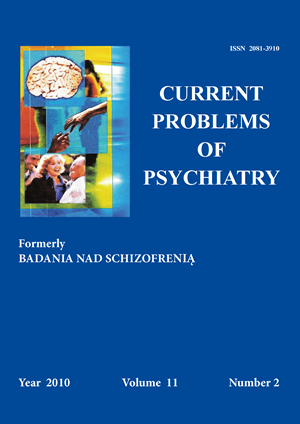Evoked potentials in bipolar disorder - review of the literature
Keywords:
bipolar disorder, evoked potentialsAbstract
This publication is the review of the literature on evoked potentials in bipolar disorder. Patients with bipolar disorder (BD) exhibit aberrations in evoked potentials. Increasing number of investigations of evoked potentials in bipolar disorder gave contribution to an effort to discover the endophenotypes for this disorder mesurment of evoked potentials could also be the method of efectivness of the treatments with SSRIs and lithium of bipolar dis-order. Increasing number of investigations of evoked potentials in bipolar disorder gave many important informa-tion and allowed this clinical and neuropsychological data to extrapolate to neurophysiological background al-though currently, no neurophysiological marker exists for bipolar disorder.
References
1. Goldberg J., Chengappa K. Identifying and treating cognitive impairment in bipolar disorder. Bipolar Disord., 2009; 11(Suppl 2):123-137.
2. Sachs G, Schaffer M, Winklbaur B. Cognitive deficits in bipolar disorder.Neuropsychiatr., 2007; 21(2): 93-101.
3. Osuji I.J., Cullum C.M. Cognition in bipolar disorder. Psychiatr. Clin. North. Am., 2005; 28(2): 427-441.
4. Malhi G.S., Ivanovski B., Hadzi-Pavlovic D., Mitchell P.B., Vieta E., Sachdev P. Neuropsychological deficits and functional impairment in bipolar depression, hypomania and euthymia. Bipolar Disord., 2007;9(1-2): 114-125.
5. Fridberg D., Hetrick W., Brenner C., Shekhar A., Steffen A., Malloy F., O'Donnell B. Relationships between auditory event-related potentials and mood state, medication, and comorbid psychiatric illness in patients with bipolar disorder. Bipolar Disord., 2009; 11(8): 857-866.
6. O'Donnell B.F., Vohs J.L., Hetrick W.P., Carroll C.A., Shekhar A. Auditory event-related potential abnormalities in bipolar disorder and schizophrenia. Int. J. Psychophysiol., 2004; 53(1): 45-55.
7. Hall M.H., Schulze K., Rijsdijk F., Kalidindi S., McDonald C., Bramon E., Murray R.M., Sham P. Are auditory P300 and duration MMN heritable and putative endophenotypes of psychotic bipolar disorder? A Maudsley Bipolar Twin and Family Study. Psychol. Med., 2009; 39(8): 1277-1287.
8. Fridberg D.J., Hetrick W.P., Brenner C.A., Shekhar A., Steffen A.N., Malloy F.W., O'Donnell B.F. Relationships between auditory event-related potentials and mood state, medication, and comorbid psychiatric illness in patients with bipolardisorder. Bipolar Disord., 2009; 11(8): 857-866.
9. Schulze K.K., Hall M.H., McDonald C., Marshall N., Walshe M., Murray R.M., Bramon E. Auditory P300 in patients with bipolar disorder and their unaffected relatives., Bipolar Disord., 2008; 10(3): 377-386.
10. Strik W.K., Ruchsow M., Abele S., Fallgatter A.J., Mueller T.J. Distinct neurophysiological mechanisms for manic and cycloid psychoses: evidence from a P300 study on manic patients. Acta Psychiatr. Scand., 1998; 98(6): 459-466.
11. Muir W.J., St Clair D.M., Blackwood D.H. Long-latency auditory event-related potentials in schizophrenia and in bipolar and unipolar affective disorder. Psychol. Med., 1991; 21(4): 867-879.
12. O'Donnell, B.F., Vohs, J.L., Hetrick, W.P., et al. Auditory event-related potential abnormalities in bipolar disorder and schizophrenia. I. J. Psychophysiology, 2004; 53: 45-55.
13. Kaya E., Aydemir O., Selcuki D. Residual symptoms in bipolar disorder: the effect of the last episode after remission. Prog. Neuropsychopharmacol. Biol. Psychiatry, 2007; 31(7): 1387-1392.
14. Salisbury D.F., Shenton M.E., Sherwood A.R., Fischer I.A., Yurgelun-Todd D.A., Tohen M., McCarley R.W. First-episode schizophrenic psychosis differs from first-episode affective psychosis and controls in P300 amplitude over left temporal lobe. Arch. Gen. Psychiatry, 1998; 55(2): 173-180.
15. Salisbury D.F., Shenton M.E., McCarley R.W. P300 topography differs in schizophrenia and manic psychosis. Biol. Psychiatry, 1999; 45(1): 98-106.
16. Enoch M.A., White K.V., Harris C.R., Rohrbaugh J.W., Goldman D. Alcohol use disorders and anxiety disorders: relation to the P300 event-related potential. Alcohol Clin. Exp. Res., 2001; 25(9): 1293-1300.
17. Hall M.H., Rijsdijk F., Kalidindi S., Schulze K., Kravariti E., Kane F., Sham P., Bramon E., Murray R.M. Genetic overlap between bipolar illness and event-related potentials. Psychol. Med., 2007; 37(5): 667-678.
18. Lahera G., Pedrera A., Cabañes L., Fernandez-Lorente J., Simal P., Montes J.M., Saiz-Ruiz J. P. 300 event-related potential in euthymic patients with bipolar disorder. Prog. Neuropsychopharmacol. Biol. Psychiatry, 2009; 33(1): 16-19.
19. Szelenberger W. Potencjały wywołane (Evoked potentials). Elmiko, Warszawa 2000.
20. Gershon E.S., Goldin L.R. Clinical methods in psychiatric genetics. I. Robustness of genetic marker investigative strategies. Acta Psychiatr. Scand., 1986; 74(2): 113-118.
21. Leboyer M., Bellivier F., McKeon P., Albus M., Borrman M., Perez-Diaz F., Mynett-Johnson L., Feingold J., Maier W. Age at onset and gender resemblance in bipolar siblings. Psychiatry Res., 1998; 81(2): 125-131.
22. Lenox R.H., Gould T.D., Manji H.K. Endophenotypes in bipolar disorder. Am. J. Med. Genet., 2002; 114(4): 391-406.
23. Benes F.M. Searching for unique endophenotypes for schizophrenia and bipolar disorder within neural circuits and their molecular regulatory mechanisms. Schizophr. Bull., 2007; 33(4): 932-936.
24. Pierson A., Jouvent R., Quintin P., Perez-Diaz F., Leboyer M. Information processing deficits in relatives of manic depressive patients. Psychol. Med., 2000; 30(3): 545-555.
25. Schulze K.K., Hall M.H., McDonald C., Marshall N., Walshe M., Murray R.M., Bramon E. P50 auditory evoked potential suppression in bipolar disorder patients with psychotic features and their unaffected relatives. Biol. Psychiatry, 2007; 62(2): 121-128.
26. Bestelmeyer P.E., Phillips L.H., Crombie C., Benson P., St Clair D.The P300 as a possible endophenotype for schizophrenia and bipolar disorder: Evidence from twin and patient studies. Psychiatry Res., 2009; 169(3): 212-219.
27. van Beijsterveldt C.E., van Baal G.C. Twin and family studies of the human electroencephalogram: a review and a meta-analysis. Biol. Psychol., 2002; 61(1-2): 111-138.
28. Hall M.H., Schulze K., Sham P., Kalidindi S., McDonald C., Bramon E., Levy D.L., Murray R.M., Rijsdijk F. Further evidence for shared genetic effects between psychotic bipolar disorder and P50 suppression: a combined twin and family study. Am. J. Med. Genet. B. Neuropsychiatr. Genet., 2008; 147B(5): 619-627.
29. Patterson, Julie V; Sandman, Curt A; Ring, Alex; Jin, Yi; Bunney Jr., William E, An initial report of a new biological marker for bipolar disorder: P85 evoked brain potential Bipolar Disorders, Volume 11, Number 6, September 2009, (14): 596-609.


